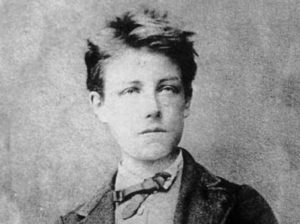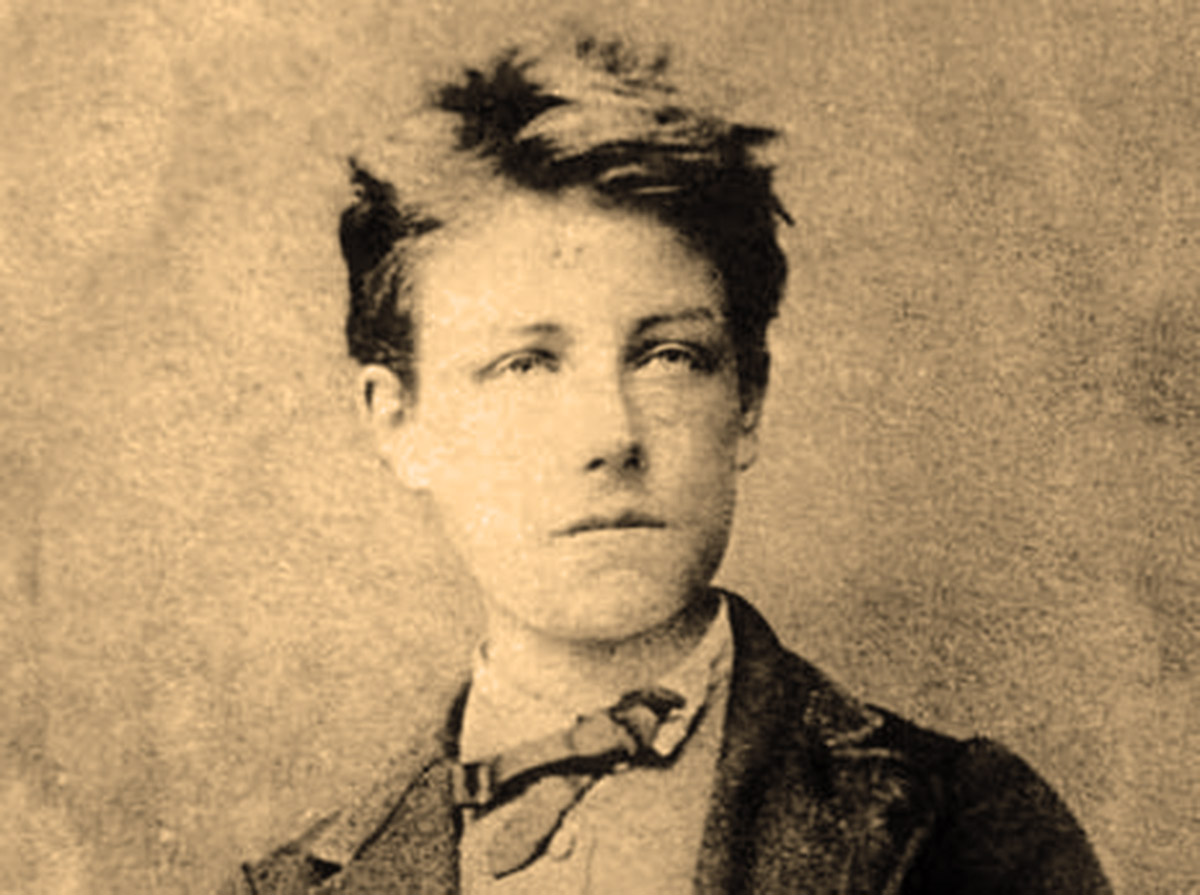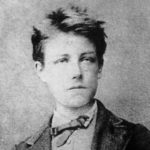
At the heart of our time, there’s a night, a vertigo.
As there was Dante’s journey, so now there is the journey of Rimbaud. There is, in the heart of our time an “insignificant” (“adolescent” say those who, protected by an assumed maturity, want to dodge its blows) night or season in Hell. In the heart of modernity (and of what it brings into question) there’s a poet in hell. There already was one, of course. In fact, there was a poet in hell-purgatory-paradise. But now that we are distanced from the fear and trembling in front of Mystery that the Christian era recognized in all circumstances, now that the heart marvels at the smoky streets of the city, marvels at absinthe and at the metaphysical revolution (and since the refuge of an education by now respected only formally has been destroyed), now the heart suffers from boredom with itself and when it reaches the threshold of the unknown it “collapses” and loses the sense of “visions” that open up to it there as he says in the famous “letter of the seer.”
It is not by chance, as we are taught by the greatest living Italian poet, that the young poet of Charleville is the only one who can draw near to the Florentine exile with a special kind of proximity-distance relationship. They are two poets, two journeys where the author and the character coincide, where, that is to say, experience counts. And in this place all presumed truths are put to the test of experience. Because of this they are closer to the reader. It should not be forgotten that A Season in Hell (“relation d’un combat spirituel”) is the only book that Rimbaud expressly wanted published.
A vertigo in the heart of Europe, a coming and going that is always seeking, a continual leaning towards the possible. There’s a man “mystique à l’état sauvage” who, the day before his death asks the Messaggeries Marittimes what time he should be carried on board to set off again. If it’s true that intellectual pride was the poison that closed the human heart and reason to a sense of mystery, if it’s true that Baudelaire marks the beginning of modernity because he sings of Ennui and a tragically “dual” life with the splendid dirge that many will join (but with less sorrow and more philosophy), it is undeniable that the most moving poetic renderings of those same bored, drugged hearts are to be found in Rimbaud’s Season in Hell. There everything “surrenders.” In that “pagan book” an infirm and perverse gesture sets before us every kind of crisis -- that of religion, of love, of science, of memory, of dream, of art – and subjects them to his methodical, yet split-second, test. None of these elements of human experience seem to be capable of helping Rimbaud approach his “destiny of happiness,” to that “salut” which is as desired and imagined as it is mysterious. Clearly the boy is inside a catastrophe, like Hamlet, notes Bonnefoy. “The angels” wrote a young and acute reader of Rimbaud, “know immediately and since always.” Everything surrenders because nothing is enough for the man in search of himself. “I want liberty in salvation. How am I to pursue it?” Exactly in the place where it seems the most dense obscurity of signs and words is felt, the sense of them makes itself clear and self-evident. Rimbaud is anything but obscure. He declares immediately the “key” with which to recapture lost innocence: “charity is this key.” Immediate, precise, almost Paul-like, that is, exactly like St. Paul in his “hymn” (a scandalous climax for another of the poètes maudits, for George Trakl, and for our own Pasolini; it would be interesting to study the strange attraction between Saint Paul and the extremities of literature). A heartbreaking affirmation because of the impossibility that such a key might actually be able to be used and is not simply a dream. In the verses of Rimbaud there’s a “method to nail down our words and our experience of the world to colors.”
He does not confront any new themes. He speaks about what everyone speaks about. He turns out to be more useful than Socrates in terms of understanding, today, something of ourselves. Rimbaud who believed everything around him to be of himself, tends toward the motion of leaving. His journey will be neither one of descent, nor an itinerarium mentis, nor a journey around his room. As if to pin down a great and simple allegory, his visionary wandering will end in a journey that is wrapped in mystery. The journey to Africa, more than a post-literary act or a definite rebellion, is none other than the mirror of poetry in its descent into hells, in the groping for things and people in the constant search for “salut” in liberty. “Mon sort dépende de ce livre” he apparently said.
He’s a typical rebel, they say, exactly because he didn’t deal with new themes. It’s true. But like Van Gogh, he put – or better, he surprised – things in a light from which they’ll escape only with difficulty. An extreme light that we perceive only in glimpses, confusedly. The light of “faiblesse.” “European culture” wrote Mario Luzi in a good essay on Rimbaud “to which moreover we send the reader who wishes to follow in lapidary detail the kinships and correspondences between the poet of A Season in Hell and the situation of poetry in Italy and Europe, to be quite frank, feels the lack of heresy.”
Already Baudelaire had demonstrated an “enormous capacity for suffering” (Eliot). He had restored citizenship to the profound sense of original sin, to that entropy or “fall” that concerns every “élan” and every “beauté.”
Most of all in Rimbaud it is not a question of a morbid complacency towards “the limit.” In fact the more acute the perception of a “salut” promised by life (the festival of youth), the more the lack of energy for reaching it is lived like a pulsar or a black hole, like “the” problem of existence (to be “a negro,” an inferior race, victim of a “harrowing misfortune.”
THE HELL OF UTOPIAS
In Rimbaud this “sickness of will” is at the origin of hell. It undermines every utopia. Rimbaud’s hell is not “strictu senso” the Christian hell; if anything, it is the opposite. It is non-Christian. It is the hell of every presumptive paradise obtainable thanks to every moral, sensual, intellectual and religious force. The Christian paradise (as well as the Christian hell) depends instead on the result of an encounter with Grace, on a mysterious encounter with Someone outside the realm of human initiative. There is no trace of this kind of encounter in any of Rimbaud’s work. The Christ that he met is “a father-in-law,” “born together with Monsieur Proudhomme,” a kind of “declaration of science” that authorizes man to make believe, to have masks.
And yet, paradoxically, Rimbaud’s hell, as he writes in “Morning” “was truly hell; the ancient one, the one where man’s son opened the doors.” Hell is one of the fundamental questions for the Christian conception of man. It indicates, in fact, that salvation depends on man’s free response to his encounter with Christ, to the call of Grace. So the value of liberty is raised to the highest degree (and for Rimbaud the term “liberty” is indistinguishable from the term “salut”). Rimbaud’s hell is a situation that makes clear that a “destiny of happiness” exists elsewhere. Nevertheless, the key is missing, the road (the truth in soul and body) that leads to it is missing. But it is a hell on earth. It’s the hell of utopias (the failure of paradise on earth). First of all, it is the hell of the utopian revolution that high-school aged Arthur belonged to (that “changer la vie” in A Season in Hell is not political). It is the “faiblesse” that disturbs every love, perverts it, chases it away. It’s the atrocity that sickens civilization, causing the idea of work as the truth of human existence to appear and disappear. It weakens the conscience so that it flees from the choice imposed by the tree of good and evil which fades into a little shrub behind one’s back, almost like a spectral phantom. It’s the faiblesse of Western man who dreams of running away to an imaginary Orient, or towards a Christianity by now almost impossible because it’s been overturned by new scribes and pharisees – a “disincarnation” (though even reduced to this state it exercises a repulsion ready to turn itself into confusion and strong fascination), or towards “the festival of a thousand colors” of a life stuck in childhood.
Rimbaud’s dream is “strength.” Those who return from Africa are “strong.” The “saints” and the “hermits” are strong. Or the “constrained convict,” he who, sentenced to life, looks with the eyes of a condemned man on the world and has only himself as “witness to his own glory.”
“Hell,” writes the poet in A Season in Hell, “cannot touch the pagans.” This is the hell of the man who lives a spirituality marked by Christianity, but who is nonetheless not a Christian.
BAPTISM, SLAVERY, NOSTALGIA.
Vertigo, and therefore a journey. A movement that leads nowhere vanishes in mystery. It overturns all the masks of European culture. Beauty, for example, becomes something that can be insulted and reviled. It isn’t sung about, mind you, neither the end or “death,” nor its transfiguration in “other” as the self-appointed members of the avant-guard of every century take it upon themselves to insist upon. It is said, simply, that it is possible to “insult” beauty. Its recognition depends, then, not on a state of grace but on a moral attitude. And there it can be found “bitter” -- which is the taste of beauty without truth. It remains “beauty,” almost resisting, vestigial version of itself, denied itself, a terrible companion on the lap of the poet, educated at the desks surrounding the sunny aesthetic of the classics. It is also infected by the virus of the gaze of the poet: to Arthur’s gaze it presents itself as a phantasm. It’s necessary to be a visionary of much greater proportions, exceeding the measure of every sense – and not necessarily in the direction of confusion (that confusion in which, suffering continually and with harrowing irony the young “maudit” descends). Instead it should be something similar to the “déréglement” of the saints. Perhaps it is a déréglement similar to that felt by Leopardi faced with his own poem “To His Lady.” The moral attitude that captures the truth of the beautiful (and tastes it again) is that of waiting – the availability and the tension in front of the appearance of a sign. Rimbaud actually moves within a religious kind of aesthetic that he has made sure to strip of any security and every automatism. Claudel is right when he speaks of an “inflection” more than a “voice” or even less a “Word” as what moved Rimbaud’s poetry. He hears Rimbaud’s “marvelous prose” impregnated “like the smooth dry wood of a stradivarius with its intelligible sound.” The poetry of A Season in Hell
makes sure to burn every rhetoric: here the diaphragm no longer exists – as Luzi notes – between words and things. Or as Valery pointed out, it’s a question of “a perpetual exchange between the psychological and the physical, or rather what is visible with the eyes. Visible outside, visible inside.”
Beauty does not guarantee purity, the “salut” to anyone. The Devil is beautiful (this is not news; read the chronicles of the monks), nothing is pure, purity is not anyone’s prerogative. It is a conquest in every instant, a gift, therefore, because human effort can only prepare the conditions for a state of purity that God alone can cause to emerge since it belongs to him alone.
Rimbaud looks at the world (the world that humanism and rationalism sought to rid of any sense of excess) with the mind of the convict, upon whom the life-sentence is always weighing (and it’s not by chance that the most Rimbaud-like of the Italian writers, the beloved Testori, said that the sight of a convict was the episode that most marked his own youth.) The world delivered by humanism to modernity is a life-sentence (sometimes agreeable, but only for the most fortunate.) This way of feeling the world is the fruit of a particular inheritance: “parents, you made my disgrace and your own – I’m a slave of my baptism.” Rimbaud perceives in his own nature, on his own flesh, the sign (baptism) that he belongs to something grand and mysterious. (“I am not a prisoner of my reason. I said: God”). But this bigger thing is, in fact, unknown. Cursed or invoked, but unknown, far away. The proximity of God to the world together with the Incarnation is lived by the young man (to whom it was presented in a suffocating and reductive mode) as the proximity of a “father-in-law.” This is why the mark of baptism is perceived, inevitably, as a kind of slavery: whoever is thrown, without strength or the possibility of salvation, into the prison of the world perceives that he belongs to something that is not of this world as a source of a nostalgia so unbearable it becomes slavery. A nostalgia that becomes his master, entirely, a nostalgia that literally causes one to become enraged like a beast. With Christ removed (as Nietzsche confusedly intuited), what is inherited from Christianity is the existence of an “inferior race,” a “negro,” unable to find or try out “the freedom of salvation.” A man who, in the absence of a present God, owes “everything to the declaration of the Rights of Man.” It is not that Arthur perceives his most acute suffering because of the stuffy upbringing he underwent, (from which, as from the rest, he turned away quite early -- frankly and without inhibition) but because of the impossibility of the “journey.” He knows he’s not strong enough. He’s more honest than Nietzsche, and less of a philosopher.
THE PROBLEM IS THE PRESENT
It’s a vertigo that wipes out all of Western knowledge. “If I at least had some antecedents in any point of French history. But no, nothing.”
Western knowledge is wiped out not with a triumphant effort of cultural critique, nor with political revolution, but with the light blood of adolescence. Adolescence which is naturally always the most energetic force of crisis. Memory is liquidated as well: historical memory, artistic memory – Proust is liquidated along with his contraption. “If starting from this moment [my spirit] were truly awake, we would have arrived at truth, which perhaps surrounds us with its angels in tears!” The problem is not to return to a personal and collective past that is by-now-insignificant, but to be awake: the problem is the present. “Consider his most magical effect” writes Mallarmé in some pages that demonstrate a bit of uneasiness faced with Rimbaud “produced by the opposition of a world prior to Parnassus with a far-distant romanticism, or [the opposition of the] absolutely classical with the sumptuous disorder of a passion we cannot call anything other than spiritually exotic.”
From this point of view science, the guarantor of progress in human fate, is not “simply” questioned. Certainly the modern “viaticum” for the body and for the spirit is “progress!” – “Geography, cosmography, mechanics, chemistry!...” are “the amusements of princes and the games they prohibit!” handed over to the inferior race. It is a fierce irony: “Nothing is vanity; to science, and forward!” cries the modern Ecclesiast or rather, everyone. But the heart of Rimbaud’s critique is “science is too slow.” In the same page where he exhorts his own spirit to wake up in order to arrive at truth (“The impossible”) he says: “Ah! Science does not hurry enough for us!” That is, it doesn’t hurry enough in the research that interests us, to see if it is “plausible to possess truth in a spirit and in a body” – the truth that surrounds us.
Departing from the climate of romantic poetry and its definitions (in which he stayed for the whole first part of his production) and being a prophet (the “god” Baudelaire had already written the Flowers of Evil, opening with “Correspondances”), Rimbaud proceeds with a sort of critique of scientific spirit that is much more acute than what we might expect from a romantic poet. Not only does he accuse it of a utilitarian reduction of human action and the mythologizing of same, he affirms that it proceeds too slowly in the research that counts the most. That is, he argues that there is a methodological deficiency in scientific procedure, a difference of pace with respect to others’ methods of advancing towards the evidence of truth. It’s a critique of scientific rationalism that departs from the usual pattern of European debate. He doesn’t strand himself in a position “on principle” (or on aesthetics) in favor of or against science. Neither does he contort himself in order to cause the overlap of roles and languages as some of the poets of the successive positivist and neo avant-guardist eras do (one thinks of our Pascoli, so annihilated in front of the mystery of the cosmos as to arrive at saying that poetry is that which “makes consciousness out of science”). He doesn’t even separate poetry’s final goal from that of science; he doesn’t divide the adventures. He says, with open irony about the very idea of progress that science “goes too slowly for me.”
A QUESTION, SO AS TO BEGIN AGAIN ALWAYS
The object of Rimbaudian research is the I. He does not remove himself from the central vein of Western research. But he traverses this vein without leaving intact a single interpretive certainty about life that had been affirmed up to that time. He perceives in himself the limits of the culture learned at school and given by family. He feels no antecedents. He’s an amputated stump seeking to take hold again. In this he is similar, very similar, to every current European seventeen-year-old. he doesn’t know what his nation is, doesn’t know what love is (as Bonnefoy has written), Christ is perceived as a “father-in-law.” He imagines his own liberation in various masks, he tends to mix everything together – all the levels of discourse and value – he is “faible.” But the difference is that Rimbaud knows he comes from something he doesn’t understand anymore (baptism). He knows there is a journey to attempt, a cry to raise, because he knows there’s got to be “something” to save/discover, it can’t go on like this. Even if the journey in the “drunken boat” is destined to perpetual shipwreck, remembering only the “ancient parapets” of European culture. Even if he cannot make himself understood, “better than the beggar with his continual Pater Ave Gloria”…
He’s a poet who can help us save, at the end of this century (and always), that unique correct position that is at the beginning of every action and thought that is not inhuman: to recognize oneself -- a recognition that is not an overly pious way of going through the motions, but true and deep knowledge – as someone in need.
He wrote, almost anticipating a Pavesian ultrasound: “But not a hand my friend! and where to find help?” positing, as one of his greatest readers wrote, a possible “sign of alliance.”
As is noted, Rimbaud paid for the publication of this book.
cf the introduction to C. Baudelaire’s “Fleurs Du Mal” that I proposed for this same series of editions
Giuseppe Frangi, Arthur Rimbaud, in I grandi della cultura rivisitati, Quaderni di Litterae Communionis, 1984.
After all, his torn “lover” Paul Verlaine wrote in his book “Poètes Maudits” (1884) a propos of Rimbaud’s abandoning poetry: "He knows (Rimbaud) that we do not doubt that this abandonment is for him logical, honest, necessary.
M. Luzi, Nel cuore dell'orfanità. Introduzione ad Arthur Rimbaud, Opere, Einaudi.
T.S. Eliot, Baudelaire, in L'uso della poesia e l'uso della critica, Bompiani 1974.
J. Rivière also sustains that Rimbaud’s hell is precisely the earth, but in the poet-character Rivière identifies “the perfect being” and thus interprets the Season in Hell as “the time that a being without sin passes here with us.” Such a vision opens a “gnostic” perspective on Rimbaud’s adventure, but there do not remain, in the texts of A Season in Hell, enough evidence to justify it. The image of the “angel in exile” coined by Verlaine may be suggestive, but it does not seem to correspond to the self-awareness of the poet.
P. Claudel, Prefazione, in Opere, Mercure de France, Paris 1912
P. Valery, Pré-Teste, catalogo dell'esposizione Univ. di Paris 1966, in Opere, Mondadori, 1975
Mallarmé, letter to Mr. Harrison, Rhodes
Y. Bonnefoy, L'alchimista del verbo, Introduzione alle Opere, Mondadori, 1975



